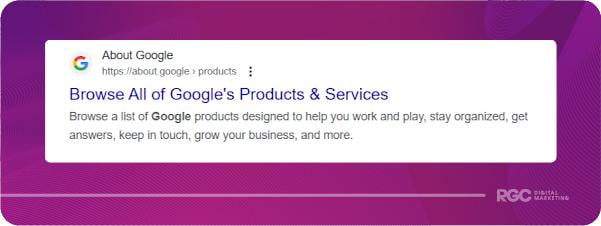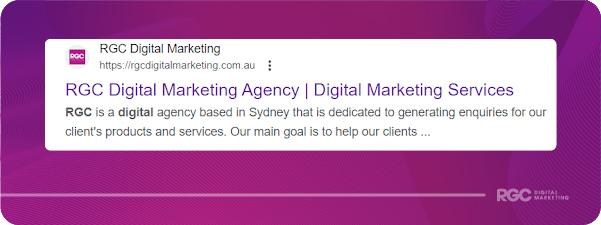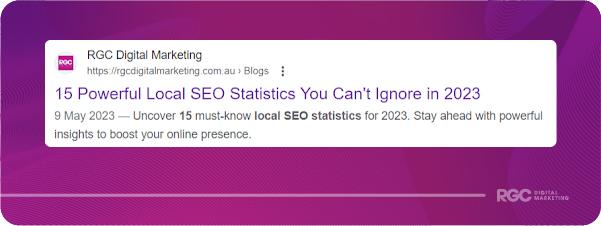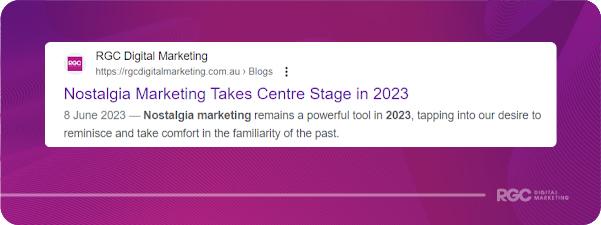A Beginner’s Guide To Writing Metadata

If you want to improve your search engine rankings, writing quality metadata is a great place to start. Optimising these short pieces of text that display in search engines is a vital part of any SEO campaign because they’re your first chance to impress your readers and let them know what to expect from your content.
Whether you’re an experienced SEO professional or a budding content writer, our guide will help you learn:
- What metadata is
- Why metadata matters
- How to write quality metadata
What is Metadata?
When you search for content on Google, each result consists of two distinct blocks of text. This is known as metadata, and every single URL on the internet can have its own unique variety.

Meta Titles
The first set of text within a web page’s metadata is a large line of blue text, and this is known as the meta title. These headlines serve as the page title and should describe the topic of content on the page.
Meta Descriptions
The second piece of text is smaller in size but longer in length, and this is known as the meta description. This text provides additional information to the reader by explaining what they can expect from the web page.
Why Does Metadata Matter?
Metadata is a perfect example of the struggle that all content writers and SEO experts face in satisfying the competing needs of readers and search engines.
Why’s that? Well, these short pieces of text are shown in the HTML code of your website, and this means Google’s search robots will crawl your metadata. This helps them understand what your page addresses and which keywords are closely related to your page.
But remember, metadata is also viewed by your potential web visitors. It gives them insight into what your page can offer, and it’s your first and only chance to encourage them to click on your website organically from search engine results pages.
As a result, the highest quality metadata very clearly and succinctly explains the content of the page to Google’s crawlers and encourages web visitors to click on the link and interact with the content. If you keep these two factors in mind, you’re halfway there!
But what does the best metadata look like? How do the best content writers create them? What steps do you need to take to make sure your metadata resonates with readers and satisfies the crawling process for Google?
Top Tips For Writing Quality Metadata

Clear and concise
The key to writing metadata is getting your point across as clearly and concisely as possible. The last thing you want to do is write a compelling title just for half of it to be cut off, so be careful not to overexplain or include words that don’t add value.
Research from Moz has revealed that 90% of meta titles that are less than 60 characters are shown in their entirety, so adhere to this benchmark as closely as possible. The same principle applies to meta descriptions, and you should aim to hit the sweet spot of between 150 and 160 characters.
This can difficult if you’ve compiled an elaborate web page full of detailed and varied information. But remember, the best meta descriptions are those that help readers and search engines understand what your page is about quickly and effectively.
Keyword Focused
For your metadata to make an impact, it needs to contain the keywords that are relevant to the content. Web visitors are inherently impatient and are looking for quick answers and solutions. So, your best chance of getting their attention is by giving them exactly what they need.
Meta titles are a great opportunity to encourage prospects to click through to your site. To deliver the accurate, concise and engaging summary they’re looking for, include the keyword as close to the beginning of the meta title as possible. This will catch their eye and potentially increase traffic to your site.

However, be wary that the same principles of keyword stuffing apply to metadata. In fact, the effects are often magnified given how few words are offered to the reader. Don’t kill your content and make it sound unnatural. Instead, only include your keywords in the most appropriate sections. This generally translates to one keyword in your meta title and a second in your meta description.

Relevant To The Content
It can be tempting to write a dramatic and attention-grabbing meta title or meta description because this might drive more traffic to your page. But there’s little point in driving traffic unless motivated potential customers are among your readers.
Remember, metadata is a crucial component of SEO and it’s no secret that SEO is a strategy best practised by patient professionals that prioritise long-term results. Even if you were to generate masses of traffic through spammy, unrelated metadata, you’d be likely to suffer from a high bounce rate and be penalised by Google for misleading users.
Instead, consider your metadata as a chance to build your authority and establish a relationship with your readers. Use your meta titles and descriptions as a chance to offer a promise to users. Fulfil this promise with engaging, relevant, and helpful content.

Unique
Personalisation and a detailed understanding of user intent have become central to effective digital marketing efforts. Every page of your website can have unique metadata to encourage users to click through to your web pages, so make sure you don’t duplicate metadata across multiple pages.
Consider which keyword searches your web pages might be shown on, and think about what that user is looking for. This will bring you one step closer to writing personalised metadata that resonates with users.
Nevertheless, writing quality metadata can be time-consuming, especially if your website has a lot of pages. If you’ve run out of time, don’t rush and write a poor meta description.
Instead, leave the description blank, because in this case, Google will generate a snippet of content containing the keyword. This makes sure your metadata is unique and still provides the user with the information they’re looking for. Google will also show its own snippet in cases where it believes it’s more relevant to the search.

Include A Call To Action
One of the most important functions of metadata and SEO more broadly is to inspire action. Calls-t0-action (CTAs) are central to this because in most cases, it’s not enough for users to simply read your content. You’ll need to let the reader know what they should do next.
The CTA that works for you will depend on the nature of your business, but regardless of what you offer, it must be clear, concise and compelling.
Do you want your reader to purchase products from your website? Tell them to “buy now”. Or would you like your readers to contribute to your charity? Let them know that they should “donate today”.
Does This Sound Like A Lot Of Work?
Writing compelling metadata is an important task and it can have a big impact on your website’s SEO. However, it takes a lot of time and effort just to understand how the best examples are written.
But by making sure you follow these best practices, you’ll be on your way to writing quality metadata that satisfies users and ranking algorithms . Don’t forget to keep analysing your metadata and making the necessary changes to achieve the best possible results.


